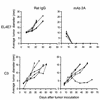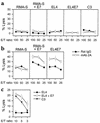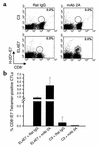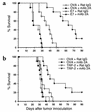Provision of antigen and CD137 signaling breaks immunological ignorance, promoting regression of poorly immunogenic tumors
- PMID: 11877473
- PMCID: PMC150893
- DOI: 10.1172/JCI14184
Provision of antigen and CD137 signaling breaks immunological ignorance, promoting regression of poorly immunogenic tumors
Abstract
Treatment of advanced, poorly immunogenic tumors in animal models, considered the closest simulation available thus far for conditions observed in cancer patients, remains a major challenge for cancer immunotherapy. We reported previously that established tumors in mice receiving an agonistic mAb to the T cell costimulatory molecule 4-1BB (CD137) regress due to enhanced tumor antigen-specific cytotoxic T lymphocyte responses. In this study, we demonstrate that several poorly immunogenic tumors, including C3 tumor, TC-1 lung carcinoma, and B16-F10 melanoma, once established as solid tumors or metastases, are refractory to treatment by anti-4-1BB mAb. We provide evidence that immunological ignorance, rather than anergy or deletion, of tumor antigen--specific CTLs during the progressive growth of tumors prevents costimulation by anti-4-1BB mAb. Breaking CTL ignorance by immunization with a tumor antigen-derived peptide, although insufficient to stimulate a curative CTL response, is necessary for anti--4-1BB mAb to induce a CTL response leading to the regression of established tumors. Our results suggest a new approach for immunotherapy of human cancers.
Figures







Similar articles
-
Divergent effects of 4-1BB antibodies on antitumor immunity and on tumor-reactive T-cell generation.Cancer Res. 2001 Mar 1;61(5):2031-7. Cancer Res. 2001. PMID: 11280763
-
NK and CD8+ T cell-mediated eradication of poorly immunogenic B16-F10 melanoma by the combined action of IL-12 gene therapy and 4-1BB costimulation.Int J Cancer. 2004 Apr 20;109(4):499-506. doi: 10.1002/ijc.11696. Int J Cancer. 2004. PMID: 14991570
-
Anti-4-1BB monoclonal antibody enhances rejection of large tumor burden by promoting survival but not clonal expansion of tumor-specific CD8+ T cells.Cancer Res. 2002 Jun 15;62(12):3459-65. Cancer Res. 2002. PMID: 12067989
-
Biochemical and immunological characteristics of 4-1BB (CD137) receptor and ligand and potential applications in cancer therapy.Arch Immunol Ther Exp (Warsz). 1999;47(5):275-9. Arch Immunol Ther Exp (Warsz). 1999. PMID: 10604232 Review.
-
Therapeutic vaccination with tumor cells that engage CD137.J Mol Med (Berl). 2003 Feb;81(2):71-86. doi: 10.1007/s00109-002-0413-8. Epub 2003 Feb 8. J Mol Med (Berl). 2003. PMID: 12601523 Review.
Cited by
-
Combinatorial PD-1 blockade and CD137 activation has therapeutic efficacy in murine cancer models and synergizes with cisplatin.PLoS One. 2013 Dec 19;8(12):e84927. doi: 10.1371/journal.pone.0084927. eCollection 2013. PLoS One. 2013. PMID: 24367702 Free PMC article.
-
Bispecific targeting of 4-1BB and CCR8 boosts antitumor immunity via Ti-Treg depletion and CD8+ activation.iScience. 2025 Jun 4;28(7):112829. doi: 10.1016/j.isci.2025.112829. eCollection 2025 Jul 18. iScience. 2025. PMID: 40612509 Free PMC article.
-
Combined vaccination and immunostimulatory antibodies provides durable cure of murine melanoma and induces transcriptional changes associated with positive outcome in human melanoma patients.Oncoimmunology. 2012 Jul 1;1(4):419-431. doi: 10.4161/onci.19534. Oncoimmunology. 2012. PMID: 22754760 Free PMC article.
-
Multivalent 4-1BB binding aptamers costimulate CD8+ T cells and inhibit tumor growth in mice.J Clin Invest. 2008 Jan;118(1):376-86. doi: 10.1172/JCI33365. J Clin Invest. 2008. PMID: 18060045 Free PMC article.
-
Escape from immunotherapy: possible mechanisms that influence tumor regression/progression.Cancer Immunol Immunother. 2004 Oct;53(10):844-54. doi: 10.1007/s00262-004-0540-x. Epub 2004 Jun 10. Cancer Immunol Immunother. 2004. PMID: 15197495 Free PMC article. Review.
References
-
- Sica G, Chen L. Modulation of the immune response through 4-1BB. Adv Exp Med Biol. 2000;465:355–362. - PubMed
-
- Vinay DS, Kwon BS. Role of 4-1BB in immune responses. Semin Immunol. 1998;10:481–489. - PubMed
-
- Pollok KE, et al. Inducible T cell antigen 4-1BB. Analysis of expression and function. J Immunol. 1993;150:771–781. - PubMed
-
- DeBenedette MA, Shahinian A, Mak TW, Watts TH. Co-stimulation of CD28- T lymphocytes by 4-1BB ligand. J Immunol. 1997;158:551–559. - PubMed
Publication types
MeSH terms
Substances
Grants and funding
LinkOut - more resources
Full Text Sources
Other Literature Sources
Research Materials
Miscellaneous

